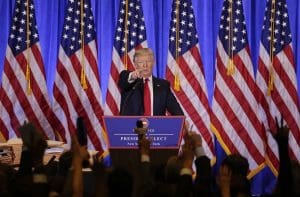New York Times admits they were too "timid" to cover Trump/Russia story
It has long been clear that the corporate media did a disastrous job covering the presidential election. And despite a reputation as the “paper of record,” the New York Times was one outlet that exemplified this journalistic malpractice, particularly in their wildly unbalanced coverage of the main stories dogging each candidate. The Times’ coverage of […]

It has long been clear that the corporate media did a disastrous job covering the presidential election. And despite a reputation as the “paper of record,” the New York Times was one outlet that exemplified this journalistic malpractice, particularly in their wildly unbalanced coverage of the main stories dogging each candidate.
The Times’ coverage of Donald Trump’s unprecedented ties to the government of Russian President Vladimir Putin was appallingly scant and lacking in urgency, especially when juxtaposed with their outsize contributions to the 600 straight days of Clinton email coverage.
[media-credit name=”MMFA” align=”aligncenter” width=”650″] [/media-credit]
[/media-credit]
In fact, the Times actually ran a story implying that the FBI did not believe there was a “clear link” between Trump and Russia — despite the fact that it was already public news that Trump’s advisory team had actually met with Kremlin officials, and despite the fact that higher-ups in the government knew for months that Trump was getting help from Russia.
Now, a new piece written by Liz Spayd, the public editor of the Times, reveals that many of the paper’s own journalists believe their inability to cover the Russia story aggressively was a massive failure:
One vein of reporting centered on a possible channel of communication between a Trump organization computer server and a Russian bank with ties to Vladimir Putin. Another source was offering The Times salacious material describing an odd cross-continental dance between Trump and Moscow. The most damning claim was that Trump was aware of Russia’s efforts to hack Democratic computers, an allegation with implications of treason. Reporters Eric Lichtblau and Steven Lee Myers led the effort, aided by others.
Conversations over what to publish were prolonged and lively, involving Washington and New York, and often including the executive editor, Dean Baquet. If the allegations were true, it was a huge story. If false, they could damage The Times’s reputation. With doubts about the material and with the F.B.I. discouraging publication, editors decided to hold their fire.
But was that the right decision? Was there a way to write about some of these allegations using sound journalistic principles but still surfacing the investigation and important leads? Eventually, The Times did just that, but only after other news outlets had gone first.
I have spoken privately with several journalists involved in the reporting last fall, and I believe a strong case can be made that The Times was too timid in its decisions not to publish the material it had.
The fact that the FBI apparently pressured the New York Times into silence is disturbing enough. The fact that the Times was “too timid” to push back and publish what it knew about Trump, particularly since they showed no such reservations publishing unverified allegations about Clinton, is that much worse. Spayd commented on this point:
If The Times didn’t write about ongoing investigations, it wouldn’t have produced the excellent scoop on Trump associates and Russia that broke Thursday night. Nor would it have so relentlessly documented the F.B.I.’s pursuit of Hillary Clinton’s emails until all facts were resolved. That investigation was fair game, and so was Trump’s.
Spayd notes that, during the entirety of the campaign, the media largely viewed Trump as a weak opponent for Clinton. She then echoes what many Americans are surely still pondering today:
But it’s hard not to wonder what impact such information might have had on voters still evaluating the candidates, an issue I chided The Times for not pursuing enough in an earlier column. Would more sources have come forward? Would we already know the essential facts?
It is indeed hard not to wonder — and we should not have to wonder. With Trump in charge of the machinery of government, it is essential that we have a Fourth Estate willing to ask tough questions, ruffle a few feathers, and stand their journalistic ground.
We must hope that this regretful tone from the Times is progress towards regaining the independent, fearless press we deserve — and will absolutely need in the Trump era.
(Alison R. Parker contributed to this article.)
Recommended

Biden campaign launches new ad focused on Affordable Care Act
Former President Trump has said he wants to do away with the popular health care law.
By Kim Lyons, Pennsylvania Capital-Star - May 08, 2024
Trump leaves door open to banning medication abortion nationwide
Donald Trump is planning to release more details in the weeks ahead about how his administration would regulate access to medication abortion, according to comments he made during a lengthy interview with Time magazine published Tuesday.
By Jennifer Shutt, States Newsroom - April 30, 2024
Biden on abortion rights: President expects to give speech Tuesday on new Florida 6-week ban
‘Having the president of the United States speaking out loud and with confidence about abortion access is a great thing’
By Mitch Perry, Florida Phoenix - April 22, 2024







































































